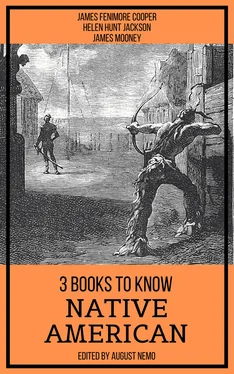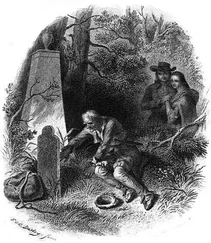Receiving no reply to this extraordinary appeal, which in truth, as it was delivered with the vigor of full and sonorous tones, merited some sort of notice, he who had thus sung forth the language of the Holy Book turned to the silent figure to whom he had unwittingly addressed himself, and found a new and more powerful subject of admiration in the object that encountered his gaze. His eyes fell on the still, upright, and rigid form of the “Indian runner,” who had borne to the camp the unwelcome tidings of the preceding evening. Although in a state of perfect repose, and apparently disregarding, with characteristic stoicism, the excitement and bustle around him, there was a sullen fierceness mingled with the quiet of the savage, that was likely to arrest the attention of much more experienced eyes than those which now scanned him, in unconcealed amazement. The native bore both the tomahawk and knife of his tribe; and yet his appearance was not altogether that of a warrior. On the contrary, there was an air of neglect about his person, like that which might have proceeded from great and recent exertion, which he had not yet found leisure to repair. The colors of the war-paint had blended in dark confusion about his fierce countenance, and rendered his swarthy lineaments still more savage and repulsive than if art had attempted an effect which had been thus produced by chance. His eye, alone, which glistened like a fiery star amid lowering clouds, was to be seen in its state of native wildness. For a single instant, his searching and yet wary glance met the wondering look of the other, and then changing its direction, partly in cunning, and partly in disdain, it remained fixed, as if penetrating the distant air.
It is impossible to say what unlooked-for remark this short and silent communication, between two such singular men, might have elicited from the white man, had not his active curiosity been again drawn to other objects. A general movement among the domestics, and a low sound of gentle voices, announced the approach of those whose presence alone was wanted to enable the cavalcade to move. The simple admirer of the war-horse instantly fell back to a low, gaunt, switch-tailed mare, that was unconsciously gleaning the faded herbage of the camp nigh by; where, leaning with one elbow on the blanket that concealed an apology for a saddle, he became a spectator of the departure, while a foal was quietly making its morning repast, on the opposite side of the same animal.
A young man, in the dress of an officer, conducted to their steeds two females, who, as it was apparent by their dresses, were prepared to encounter the fatigues of a journey in the woods. One, and she was the most juvenile in her appearance, though both were young, permitted glimpses of her dazzling complexion, fair golden hair, and bright blue eyes, to be caught, as she artlessly suffered the morning air to blow aside the green veil which descended low from her beaver. The flush which still lingered above the pines in the western sky was not more bright nor delicate than the bloom on her cheek; nor was the opening day more cheering than the animated smile which she bestowed on the youth, as he assisted her into the saddle. The other, who appeared to share equally in the attentions of the young officer, concealed her charms from the gaze of the soldiery, with a care that seemed better fitted to the experience of four or five additional years. It could be seen, however, that her person, though moulded with the same exquisite proportions, of which none of the graces were lost by the travelling dress she wore, was rather fuller and more mature than that of her companion.
No sooner were these females seated, than their attendant sprang lightly into the saddle of the war-horse, when the whole three bowed to Webb, who, in courtesy, awaited their parting on the threshold of his cabin, and turning their horses’ heads, they proceeded at a slow amble, followed by their train, towards the northern entrance of the encampment. As they traversed that short distance, not a voice was heard amongst them; but a slight exclamation proceeded from the younger of the females, as the Indian runner glided by her, unexpectedly, and led the way along the military road in her front. Though this sudden and startling movement of the Indian produced no sound from the other, in the surprise her veil also was allowed to open its folds, and betrayed an indescribable look of pity, admiration, and horror, as her dark eye followed the easy motions of the savage. The tresses of this lady were shining and black, like the plumage of the raven. Her complexion was not brown, but it rather appeared charged with the color of the rich blood, that seemed ready to burst its bounds. And yet there was neither coarseness nor want of shadowing in a countenance that was exquisitely regular and dignified, and surpassingly beautiful. She smiled, as if in pity at her own momentary forgetfulness, discovering by the act a row of teeth that would have shamed the purest ivory; when, replacing the veil, she bowed her face, and rode in silence, like one whose thoughts were abstracted from the scene around her.
––––––––
“Sola, sola, wo, ha, ho, sola!”
Shakespeare.
––––––––

While one of the lovely beings we have so cursorily presented to the reader was thus lost in thought, the other quickly recovered from the alarm which induced the exclamation, and, laughing at her own weakness, she inquired of the youth who rode by her side —
“Are such spectres frequent in the woods, Heyward; or is this sight an especial entertainment on our behalf? If the latter, gratitude must close our mouths; but if the former, both Cora and I shall have need to draw largely on that stock of hereditary courage which we boast, even before we are made to encounter the redoubtable Montcalm.”
“Yon Indian is a ‘runner’ of the army; and, after the fashion of his people, he may be accounted a hero,” returned the officer. “He has volunteered to guide us to the lake, by a path but little known, sooner than if we followed the tardy movements of the column: and, by consequence, more agreeably.”
“I like him not,” said the lady, shuddering, partly in assumed, yet more in real terror. “You know him, Duncan, or you would not trust yourself so freely to his keeping?”
“Say, rather, Alice, that I would not trust you. I do know him, or he would not have my confidence, and least of all at this moment. He is said to be a Canadian, too; and yet he served with our friends the Mohawks, who, as you know, are one of the six allied nations. 3 He was brought among us, as I have heard, by some strange accident in which your father was interested, and in which the savage was rigidly dealt by — but I forget the idle tale; it is enough, that he is now our friend.”
3 There existed for a long time a confederation among the Indian tribes which occupied the northwestern part of the colony of New York, which was at first known as the “Five Nations.” At a later day it admitted another tribe, when the appellation was changed to that of the “Six Nations.” The original confederation consisted of the Mohawks, the Oneidas, the Senecas, the Cayugas, and the Onondagas. The sixth tribe was the Tuscaroras. There are remnants of all these people still living on lands secured to them by the State; but they are daily disappearing, either by deaths or by removals to scenes more congenial to their habits. In a short time there will be no remains of these extraordinary people, in those regions in which they dwelt for centuries, but their names. The State of New York has counties named after all of them but the Mohawks and the Tuscaroras. The second river of that State is called the Mohawk.
Читать дальше













